Charles E W Bean, Diaries, AWM38 3DRL 606/17/1 - September - October 1915 - Part 6
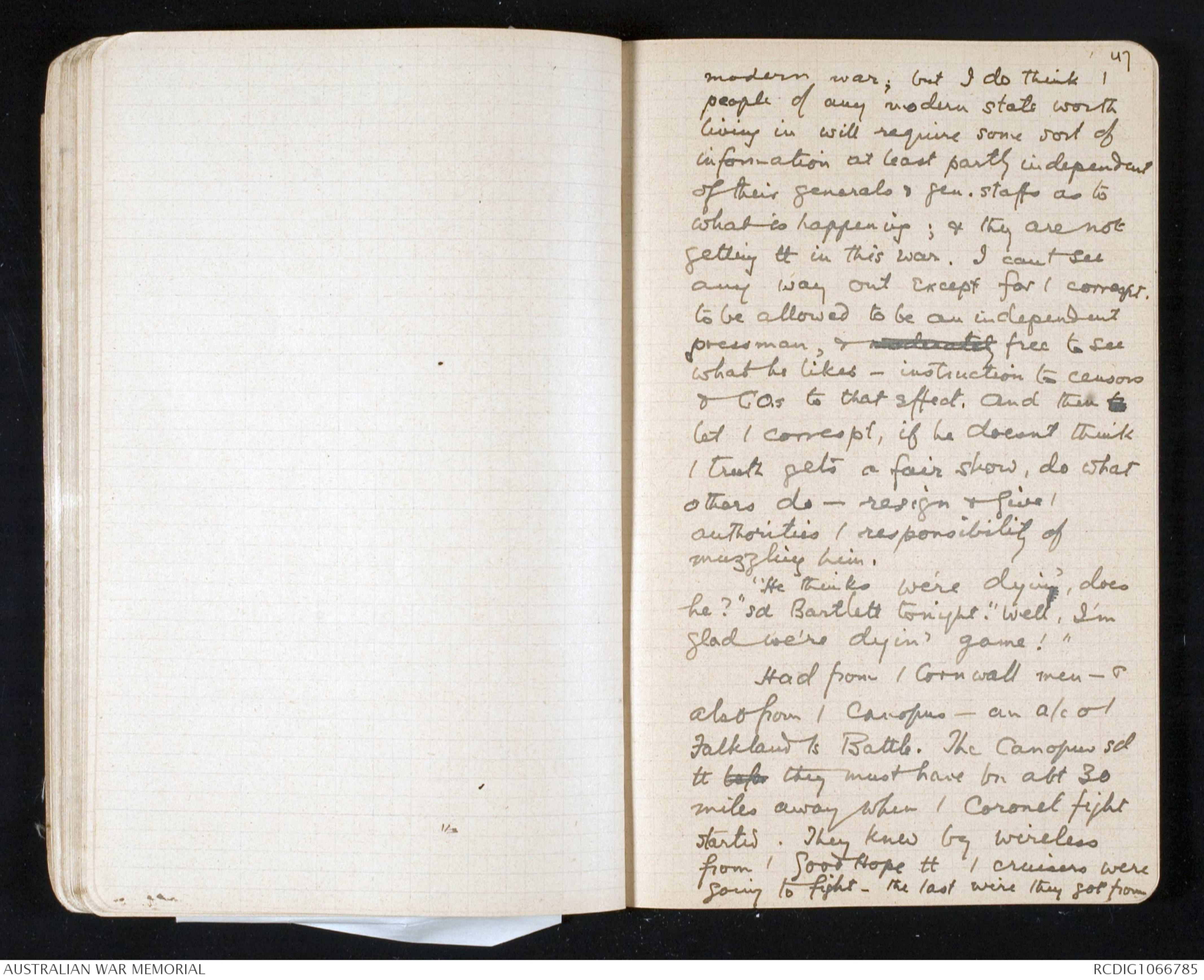
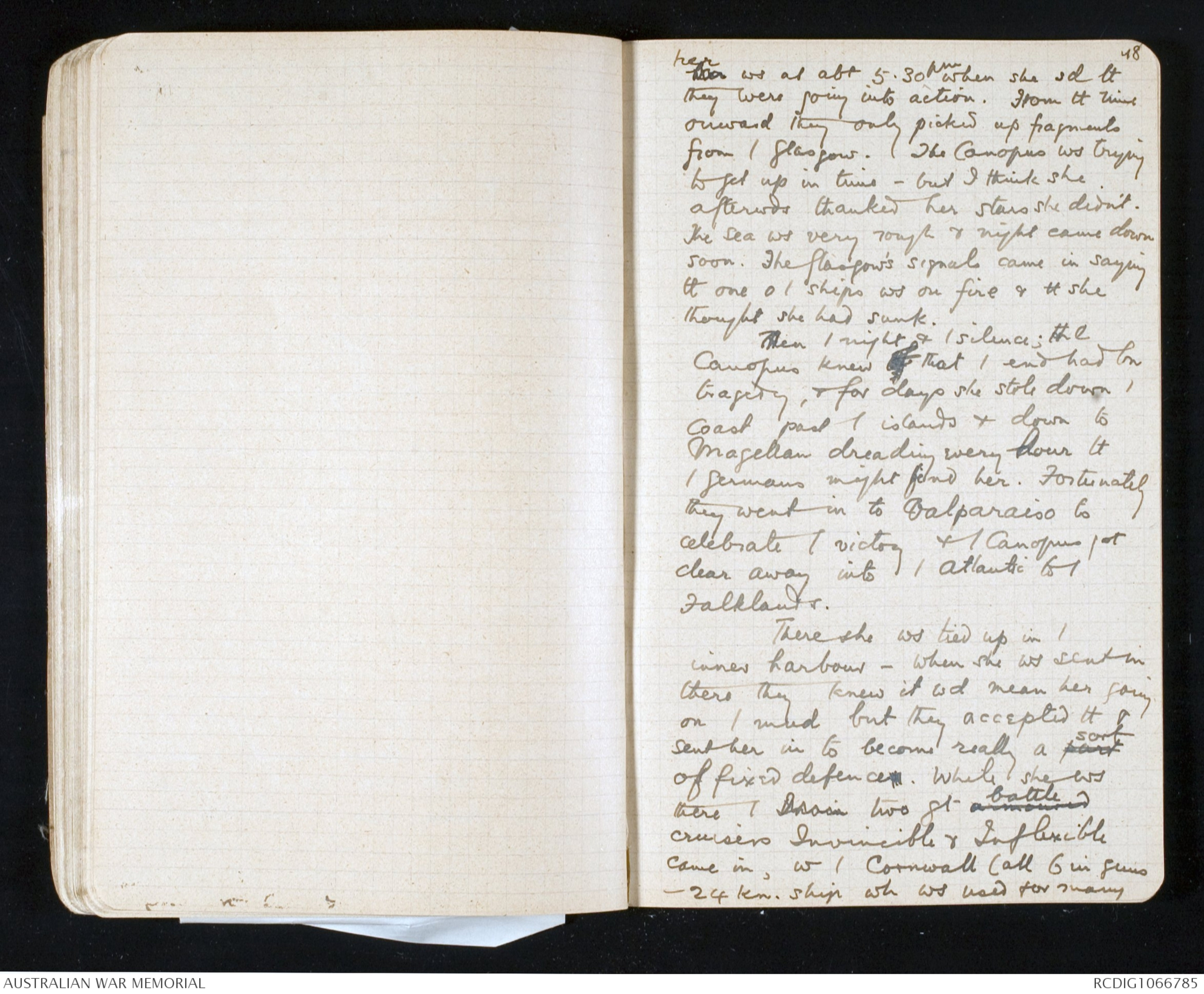
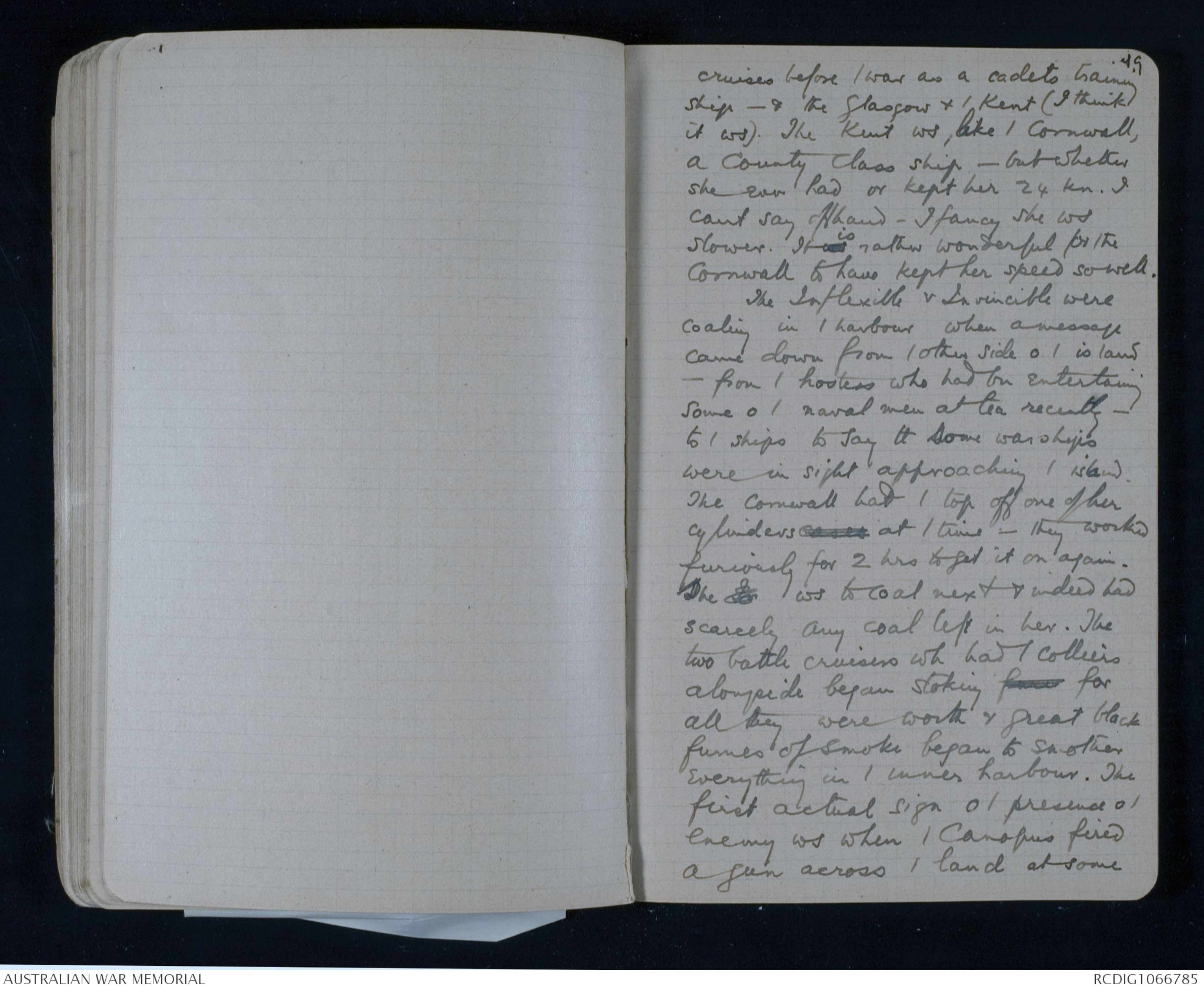
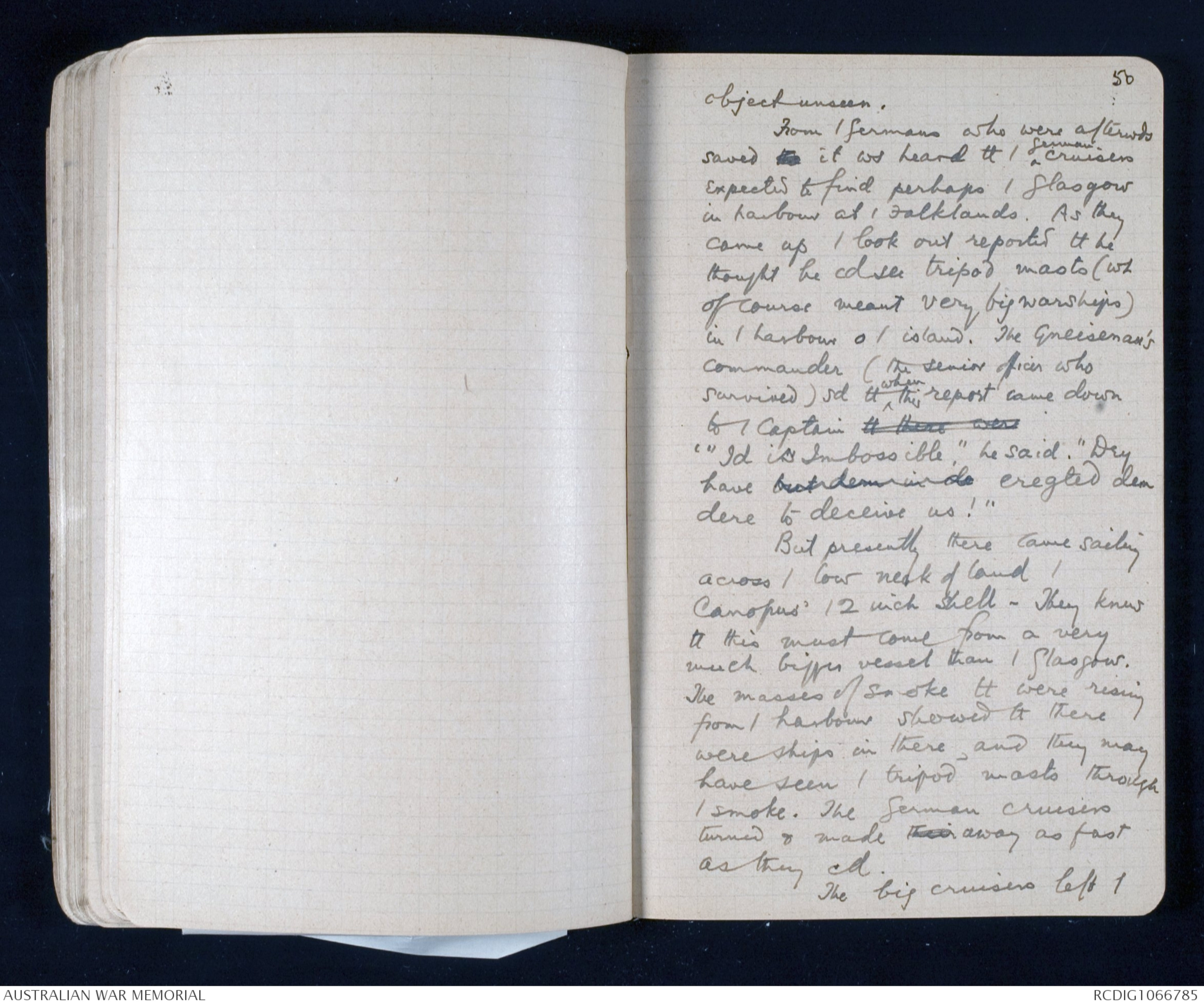
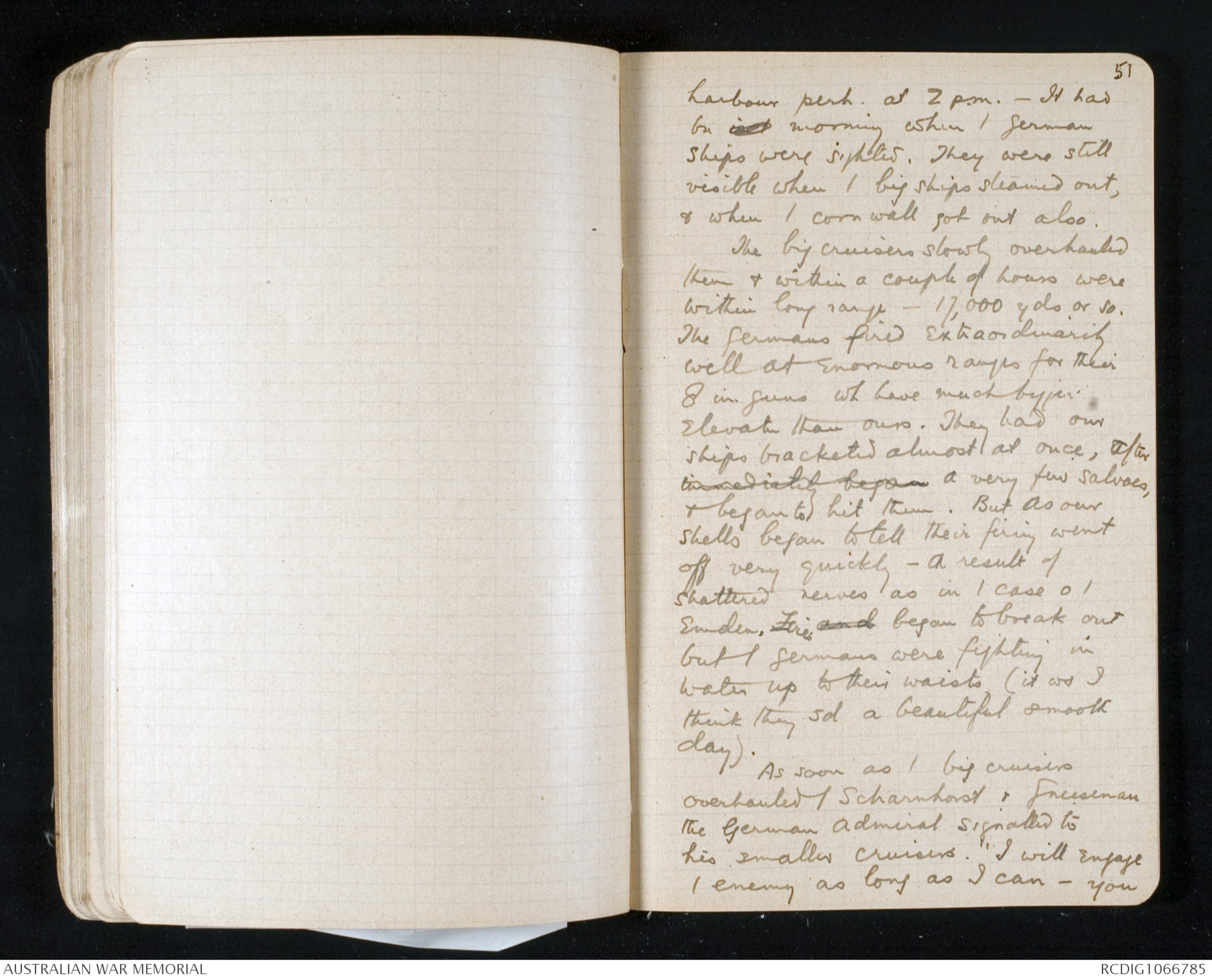
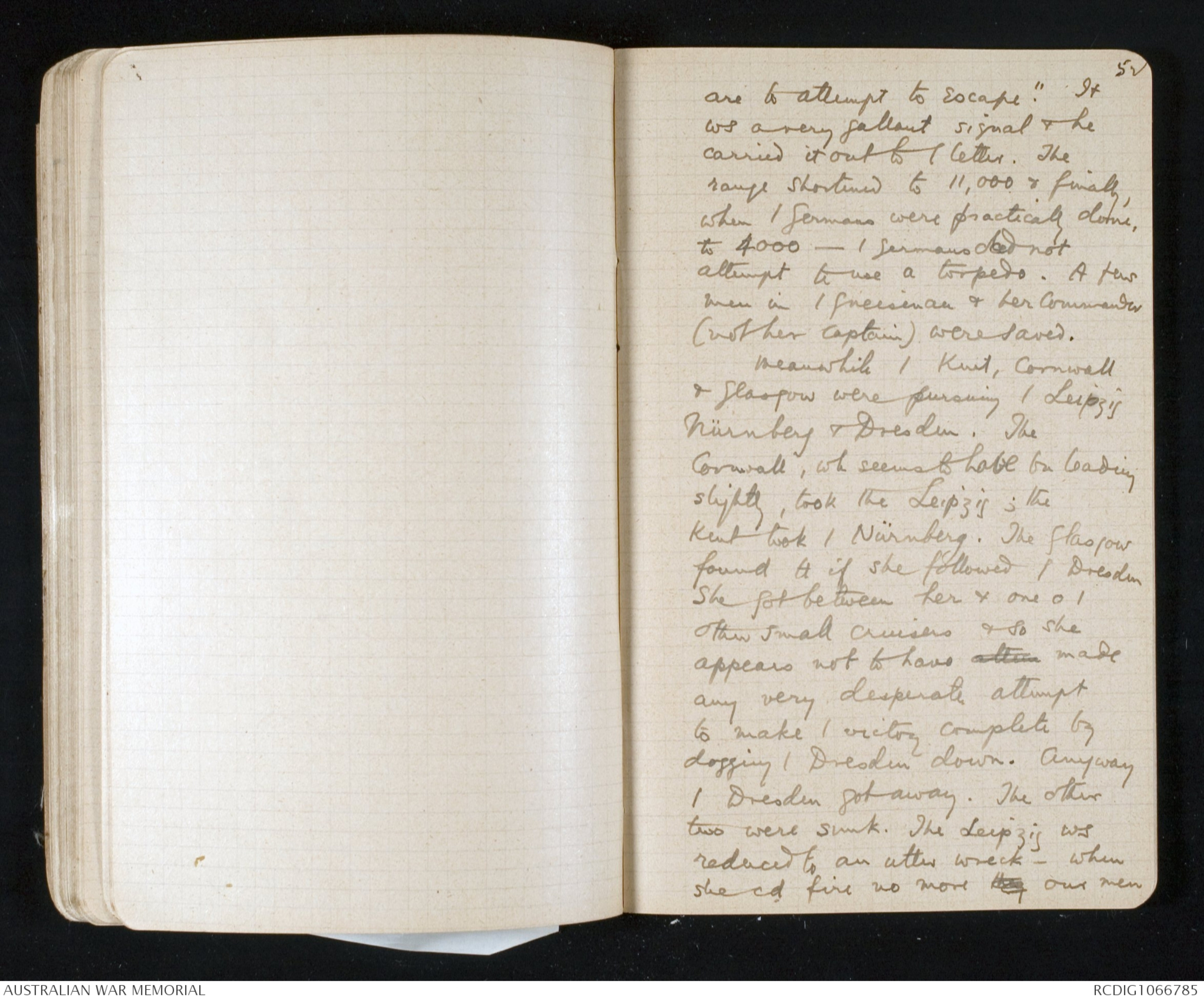
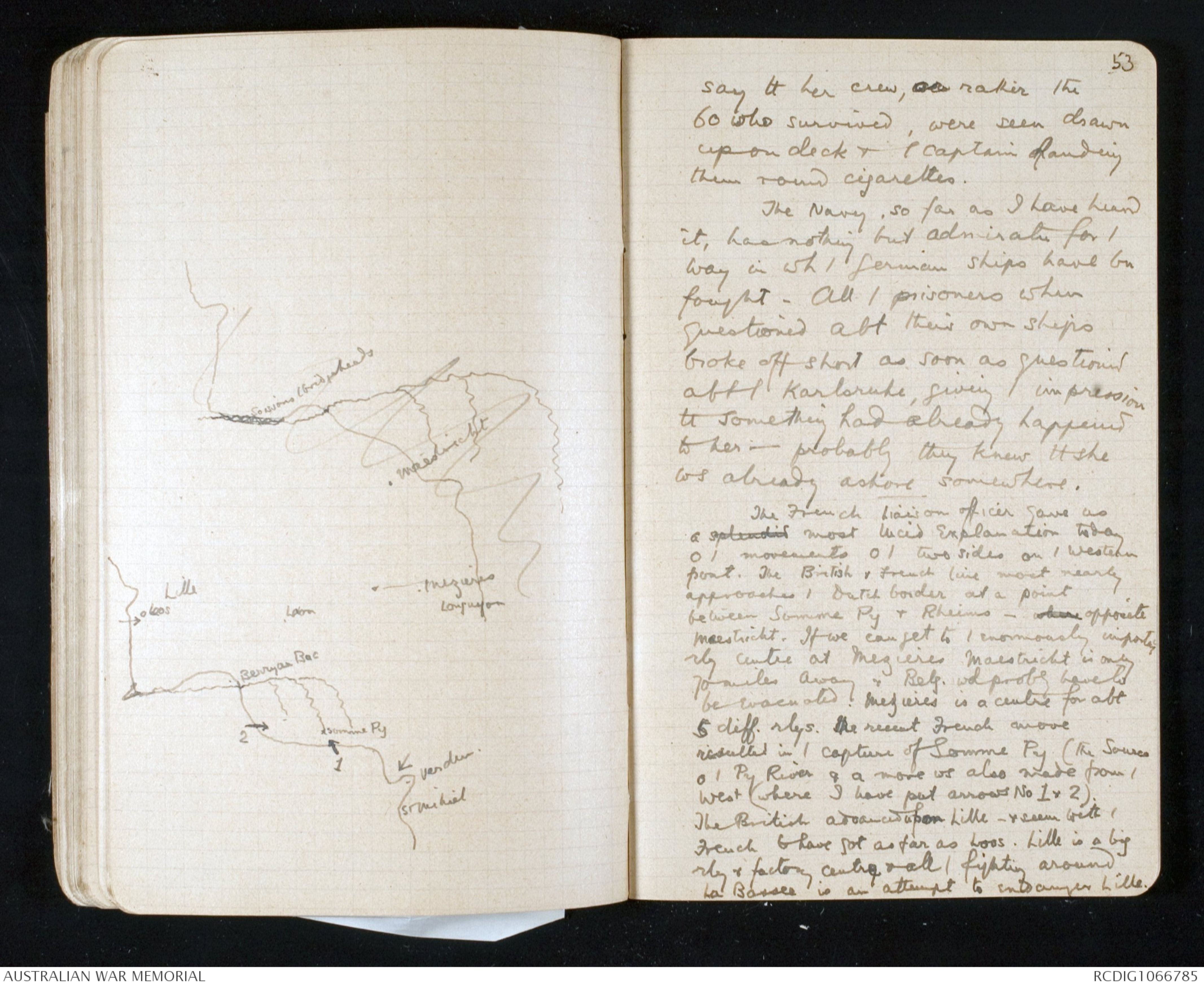
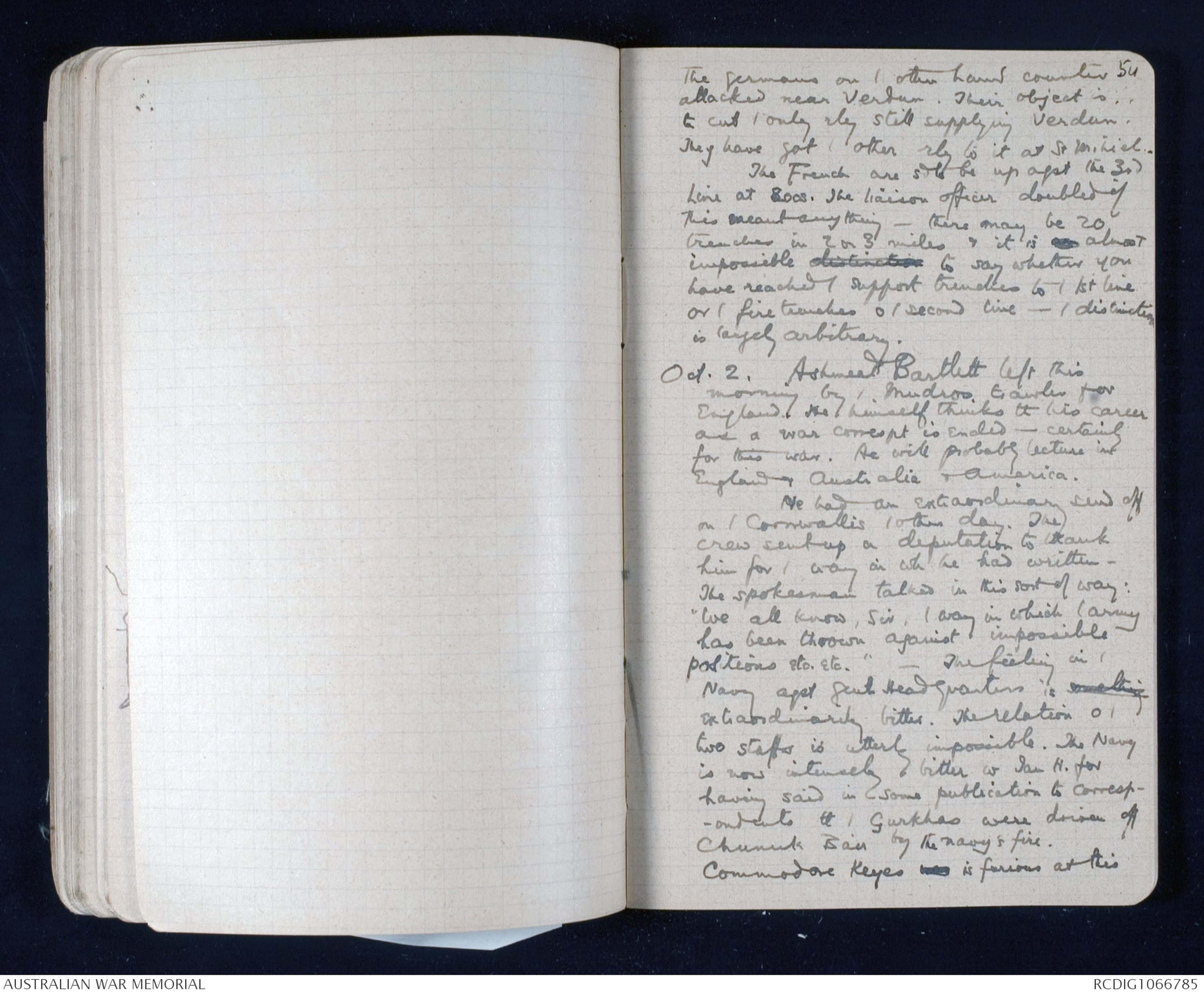
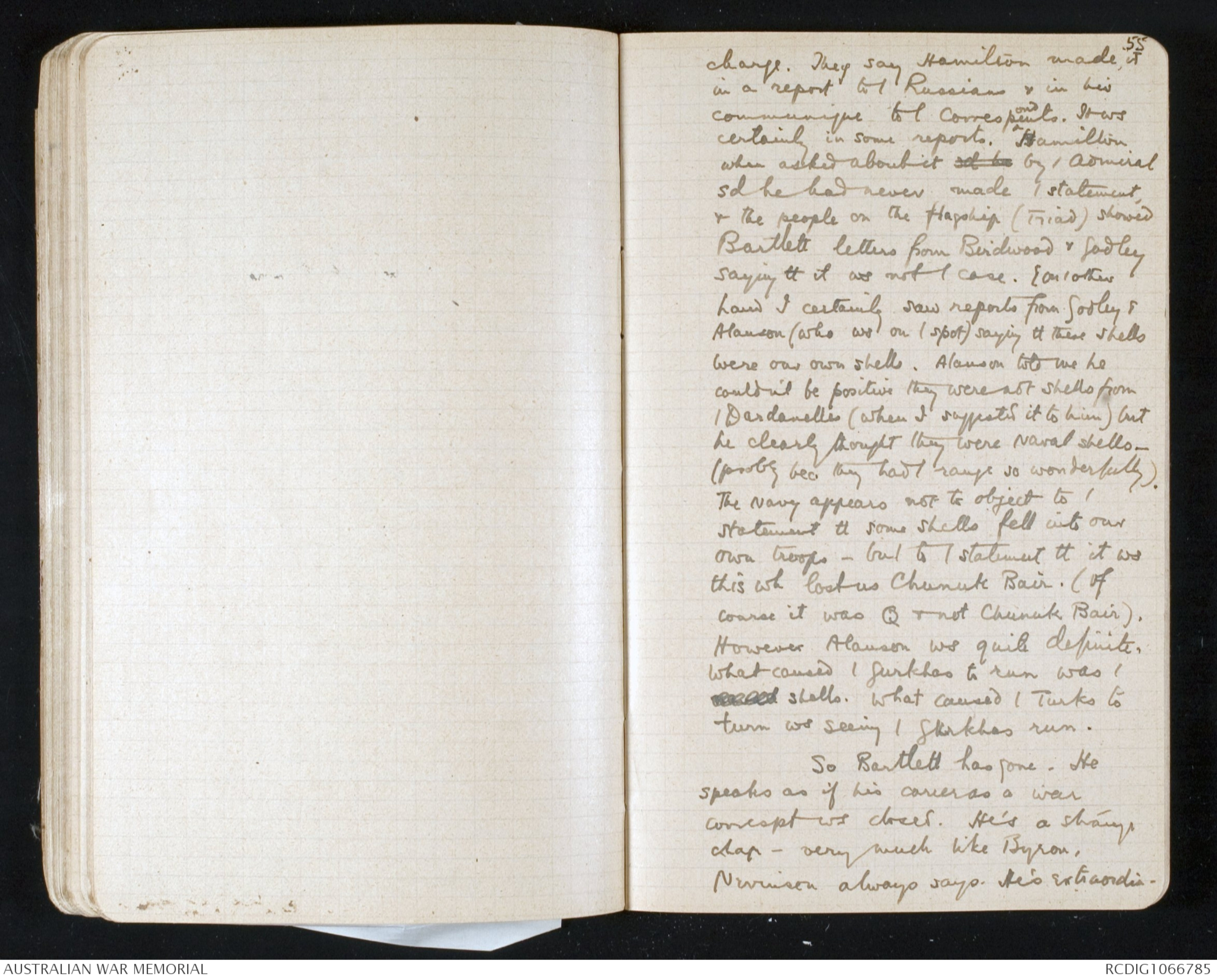
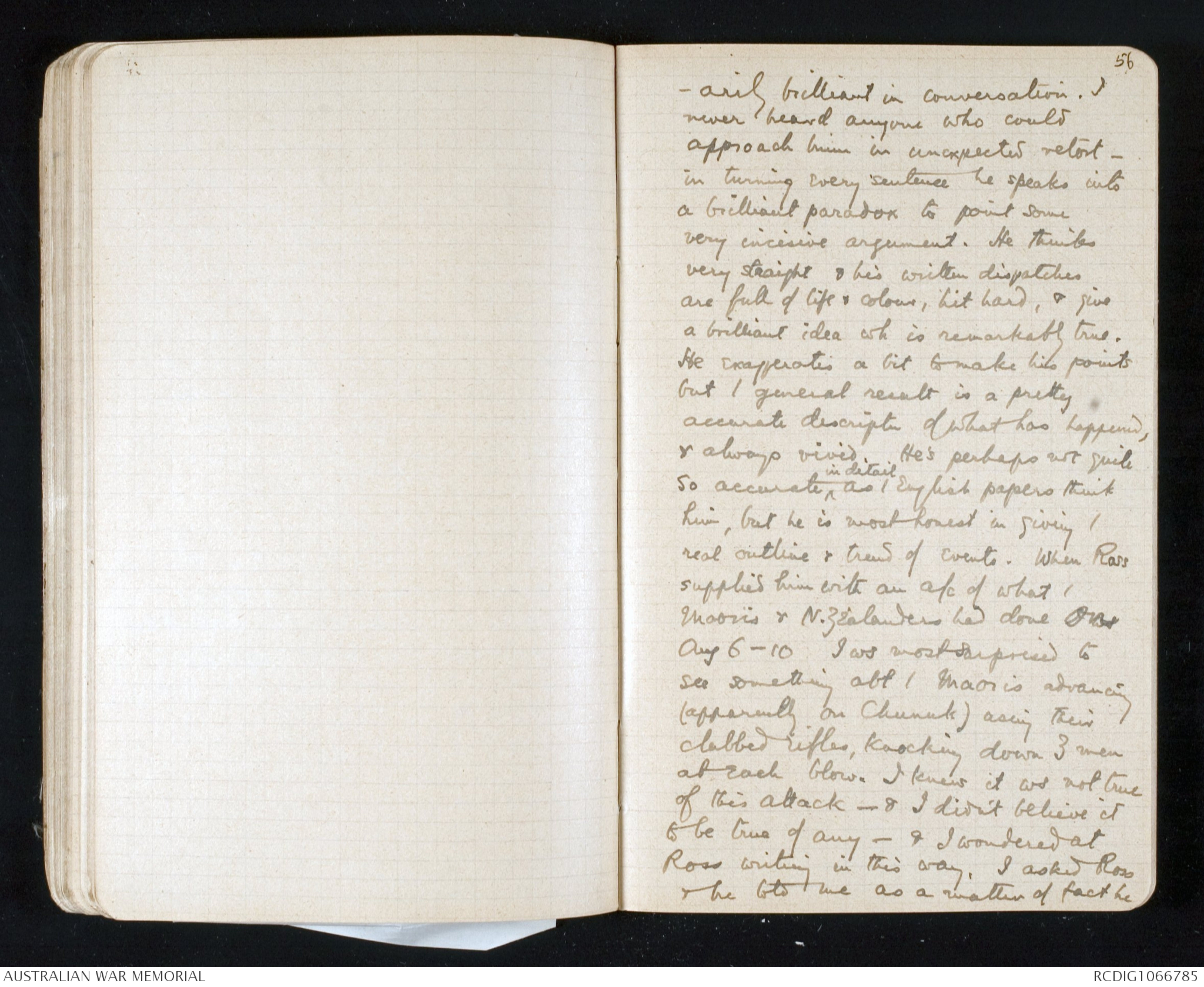
47
modern war; but I do think /
people of any modern state worth
living in will require some sort of
information at least partly independent
of their generals & gen. staffs as to
what is happening; & they are not
getting tt in this war. I cant see
any way out except for / correspt.
to be allowed to be an independent
pressman; & moderately free to see
what he likes - instruction to censors
& GO.s to that effect. And then to
let / correspt, if he doesn't think
/ truth gets a fair show, do what
others do - resign & give /
authorities / responsibility of
muzzling him.
"He thinks we're dying', does
he?" sd Bartlett tonight. "Well, I'm
glad we're dyin' game!"
Had from / Cornwall men - &
also from / Canopus - an a/c o /
Falkland Is Battle. The Canopus sd
tt befo they must have bn abt 30
miles away when / Coronet fight
started. They knew by wireless
from / Good Hope tt / cruisers were
going to fight - the last wire they got from
48them her ws at abt 5.30pm when she sd tt
they were going into action. From tt time
onward they only picked up fragments
from / Glasgow. The Canopus ws trying
to get up in time - but I think she
afterwds thanked her stars she didn't.
The sea ws very rough & night came down
soon. The Glasgow's signals came in saying
tt one o / ships ws on fire & tt she
thought she had sunk.
Then / night & / silence; the
Canopus knew of that / end had bn
tragedy, & for days she stole down /
coast past / islands & down to
Magellan dreading every hour tt
/ Germans might find her. Fortunately
they went in to Valparaiso to
celebrate / victory & / Canopus got
clear away into / Atlantic to /
Falklands.
There she ws tied up in /
inner harbour - When she ws sent in
there they knew it wd mean her going
on / mud but they accepted tt &
sent her in to become really a part sort
of fixed defences. While she ws
there / twin two gt battle amoured
cruisers Invincible & Inflexible
came in, w / Cornwall (all 6in guns
- 24 kn. ship wh ws used for many
49
cruises before / war as a cadets training
ship - & the Glasgow & / Kent (I think
it ws). The Kent ws, like / Cornwall,
a County Class Ship - but whether
she ever had or kept her 24 kn. I
can't say offhand - I fancy she ws
slower. It ws is rather wonderful for the
Cornwall to have kept her speed so well.
The Inflexible & Invincible were
coaling in / harbour when a message
came down from / other side o / island
- from / hostess who had bn entertaining
some o / naval men at tea recently -
to / ships to say tt some warships
were in sight approaching / island.
The Cornwall had / top off one of her
cylinders cases at / time - they worked
furiously for 2 hrs to get it on again.
She xx ws to coal next & indeed had
scarcely any coal left in her. The
two battle cruisers wh had / colliers
alongside began stoking furi for
all they were worth & great black
fumes of smoke began to smother
everything in / inner harbour. The
first actual sign o / presence o /
enemy ws when / Canopus fired
a gun across / land at some
50
object unseen.
From / Germans who were afterwrds
saved the it ws heard tt / ^German cruisers
expected to find perhaps / Glasgow
in harbour at / Falklands. As they
came up / look out reported tt he
thought he cd see tripod masts (wh
of course meant very big warships)
in / harbour o / island. The Gneisenau's
commander (the senior officer who
survived) sd tt ^when this report came down
to / Captain tt there were
"Id is Imbossible", he said. "Dey
have but dem in de eregted dem
dere to deceive us!"
But presently there came sailing
across / low neck of land /
Canopus' 12 inch shell - They knew
tt this must come from a very
much bigger vessel than / Glasgow.
The masses of smoke tt were rising
from / harbour showed tt there
were ships in there and they may
have seen / tripod masts through
/ smoke. The German cruisers
turned & made their away as fast
as they cd.
The big cruisers left /
51
harbour perh. at 2 pm. - It had
bn incl morning when / German
ships were sighted. They were still
visible when / big ships steamed out,
& when / Cornwall got out also.
The big cruisers slowly overhauled
them & within a couple of hours were
within long range - 17,000 yds or so.
The Germans fired extraordinarily
well at enormous ranges for their
8 in guns wh have much bigger
elevatn than ours. They had our
ships bracketed almost at once, afterimmediately began a very few salvoes,
& began to hit them. But as our
shells began to tell their firing went
off very quickly - a result of
shattered nerves as in / case o /
Emden. Fires and began to break out
but / Germans were fighting in
water up to their waists (it ws I
think they sd a beautiful smooth
day).
As soon as / big cruisers
overhauled / Scharnhorst & Gneisenau
the German Admiral Signalled to
his smaller cruisers. "I will engage
/ enemy as long as I can - you
52
are to attempt to escape." It
ws a very gallant signal & he
carried it out to / letter. The
range shortened to 11,000 & finally,
when / Germans were practically done,
to 4000 - / Germans did not
attempt to use a torpedo. A few
men in / Gneisenau & her Commander
(not her Captain) were saved.
Meanwhile / Kent, Cornwall
& Glasgow were pursung / Leipzig
Nűrnberg & Dresden. The
Cornwall, wh seems to have bn leading
slightly, took the Leipzig & the
Kent took / Nűrnberg. The Glasgow
found tt if she followed / Dresden
She got between her & one o /
other small cruisers & so she
appears not to have attem made
any very desperate attempt
to make / victory complete by
dogging / Dresden down. Anyway
/ Dresden got away. The other
two were sunk. The Leipzig ws
reduced to an utter wreck - when
she cd fire no more they our men
Diagram - see original document
53
say tt her crew, xx rather the
60 who survived, were seen drawn
up on deck & / captain handing
them round cigarettes
The Navy, so far as I have heard
it, has nothing but admiratn for /
way in wh / German Ships have bn
fought. All / prisoners when
questioned abt their own ships
broke off short as soon as questioned
abt / Karlsruhe, giving / impression
tt something had already happened
to her - probably they knew tt she
ws already ashore somewhere.
The French Liaison officer gave us
a splendid most lucid explanation today
o / movements o / two sides on / Western
front. The British & French line most nearly
approaches / Dutch border at a point
between Somme Py & Rheims - where opposite
Maestricht. If we can get to / enormously important
rly centre at Mezieres Maestricht is only
70 miles away & Belg. wd proby have to
be evacuated. Mezieres is a centre for abt
5 diff. rlys. The recent French move
resulted in / capture of Somme Py (the sources
o / Py River & a move ws also made from /
West (where I have put arrows No 1 & 2).
The British advanced upon Lille - & seem with /
French to have got as far as Loos. Lille is a big
rly & factory centre & all / fighting around
La Bassee is an attempt to endanger Lille.
54
The Germans on / other hand counter
attacked near Verdun. Their object is
to cut / only rly still supplying Verdun.
They have got / other rly to it at St Mihiel.
The French are sd to be up agst the 3rd
Line at Loos. The liaison officer doubted if
this meant anything - there may be 20
trenches in 2 or 3 miles & it is xx almost
impossible distinction to say whether you
have reached / support trenches to / 1st line
or / fire trenches of / second line - / distinction
is largely arbitrary.
Oct. 2. Ashmead Bartlett left this
morning by / Mudros trawler for
England. He himself thinks tt his career
as a war correspt is ended - certainly
for this war. He will probably lecture in
England & Australia & America.
He had an extraordinary send off
on / Cornwallis / other day. The
crew sent up a deputation to thank
him for / way in wh he had written -
The spokesman talked in this sort of way:
"We all know, Sir, / way in which / Army
has been thrown against impossible
positions etc. etc." The feeling in /
Navy agst Genl Headquarters is something
extraordinarily bitter. The relation of /
two staffs is utterly impossible. The Navy
is now intensely bitter w Ian H. for
having said in some publication to correspondents
tt / Gurkhas were driven off
Chunuk Bair by the Navy's fire.
Commodore Keyes was is furious at this
55
charge. They say Hamilton made, it
in a report to / Russians & in his
communique to / corresp^ondents. It ws
certainly in some reports. Hamilton,
when asked about it sd be by / Admiral
sd he had never made / statement,
& the people on the flagship (Triad) showed
Bartlett letters from Birdwood & Godley
saying tt it ws not / case. [On / other
hand I certainly saw reports from Godley &
Alanson (who ws on / spot) saying tt these shells
were our own shells. Alanson told me he
couldn't be positive they were not shells from
/ Dardanelles (when I suggested it to him) but
he clearly thought they were Naval shells -
(probly bec they had / range so wonderfully).
The Navy appears not to object to /
statement tt some shells fell into our
own troops - but to / statement tt it ws
this wh lost us Chunuk Bair. (of
course it was Q & not Chunuk Bair).
However Alanson ws quite definite,
what caused / Gurkhas to run was /xxxx shells. What caused / Turks to
turn ws seeing / Gurkhas run.
So Bartlett has gone. He
speaks as if his career as a war
correspt ws closed. He's a strange
chap - very much like Byron,
Nevinson always says. He's extraordinarily
56
brilliant in conversation. I
never heard anyone who could
approach him in unexpected retort -
in turning every sentence he speaks into
a brilliant paradox to point some
very incessive argument. He thinks
very straight & his written dispatches
are full of life & colour, hit hard, & give
a brilliant idea wh is remarkably true.
He exaggerates a bit to make his points
but / general result is a pretty
accurate descriptn of what has happened,
& always vivid. He's perhaps not quite
so accurate ^in detail as / English papers think
him, but he is most honest in giving /
real outline & trend of events. When Ross
supplied him with an a/c of what /
Maoris & N. Zealanders had done onx
Aug 6 -10 I ws most surprised to
see something abt / Maoris advancing
(apparently on Chunuk) using their
clubbed rifles, knocking down 3 men
at each blow. I knew it ws not true
of this attack - & I didn't believe it
to be true of any - & I wondered at
Ross writing in this way. I asked Ross
& he told me as a matter of fact he
 Deb Parkinson
Deb ParkinsonThis transcription item is now locked to you for editing. To release the lock either Save your changes or Cancel.
This lock will be automatically released after 60 minutes of inactivity.